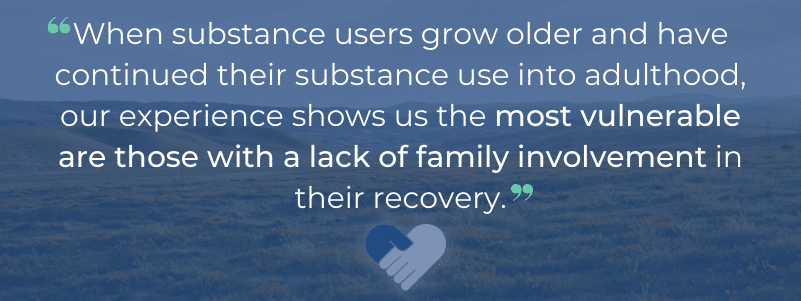Search by category, archive or keyword

It is often said that to be a good therapist or social worker for substance users, you must have once been a substance user. There certainly is something that comes with having been where the client has been. But the reality is that no data supports clinicians in recovery are more or less effective when working with substance users.
In this blog, we will be looking at the following:
- What social workers do to help substance users
- What role do social workers play in substance use recovery?
- Different types of social worker cases for substance users
- How social workers can help substance users with an addiction
- What Intervention Strategies do Social Workers use to help with Substance use?
- How can social workers prevent relapse?
- Community Reinforcement Approach (CRA)
What Social Workers Do to Help Substance Users
Social workers are vital to the integrated treatment team to help substance users. Integrated treatment teams often include case managers, therapists, counselors, social workers, medical doctors, psychiatrists, nurses, and 12 Step sponsors.
The biggest difference between social workers and therapists is that the therapist focuses on the psychological and mental needs of the substance user, and the social worker focuses on the environment that affects the substance user.
Licensed Clinical Social Workers for substance users often act as therapists and address a user’s environment. It is thought that a Licensed Clinical Social Worker (LCSW) has a broader range of intervention strategies at their disposal to assist the substance user.
Read More: Advice for Staging a Mental Health Intervention
Whether you’re being seen by a Licensed Professional Counselor or a Licensed Clinical Social Worker (LCSW), the goal is to assist the substance by utilizing the most effective intervention strategy to meet the goals set to address the problems and behaviors of the substance user.
Social workers are part of an overall team and are involved in accomplishing the goals the bigger picture sets. There may be some involved in the substance users recovery team that have been former alcohol or drug users, but what matters is the collaboration of all those involved in what ultimately makes the difference for the client in need of help for a drug or alcohol problem.
Your social worker can use evidence-based intervention strategies, whereas your Alcoholics or Narcotics Anonymous sponsor cannot. Respectfully, your social worker cannot act as your sponsor, nor can they have the same impact as a sponsor who has been there and can get raw and personal with the substance user. Thankfully, this combination can lead the substance user to a productive recovery.
A successful recovery from addiction includes:
- A case manager who helps with resources
- A therapist or social worker that helps address problems
- A medical doctor that monitors the patient’s health
- A psychiatrist who makes accurate diagnoses and provides suitable prescriptions
- A sponsor to guide patients through every step of recovery
“It takes a village” couldn’t apply more to what it takes to help a substance user find the most effective path to recovery.
What Role do Social Workers Play in Substance Use Recovery?
In addition to being a therapist and addressing the trauma, substance use, and psychological and mental factors leading to substance use, an LCSW can also address other social conditions that impact substance users early on.
These three factors are the host, the agent, and the environment.
- Host – Includes friends and role models who use substances and early experimentation with alcohol and drug use.
- Agent – Includes the substance itself.
- Environment – Includes home and family, access and availability to substances, and socioeconomic factors. The environment is the number one predictor in young adult substance users.
- https://pubmed.ncbi.nlm.nih.gov/35219997/
When substance users grow older and have continued their substance use into adulthood, our experience shows us the most vulnerable are those with a lack of family involvement in their recovery. A social worker’s role is to identify the client’s needs in this area.

It is imperative to provide group and individual therapy to a substance user. It is equally important to address other factors that contribute to substance use.
Many substance abusers blame their families for how things are, whether true or false. What may affect one person may or may not affect the other. Addicts and alcoholics rarely take ownership of their feelings, beliefs, and perceptions and often blame other people, places, and things for their problems and behaviors.
In many cases, the substance user is justified in their feelings and traumatic occurrences in early childhood or adulthood. The role of a social worker is to identify the problem or behaviors, set goals for addressing these problems and behaviors, and then apply the appropriate intervention strategy to meet the goal set.
Social workers often cannot achieve this alone and work with other professionals to help with their caseload—the more minds and eyes on the substance user, the more effective the treatment plan. We like to think of a social worker as the orchestra conductor.
A well-versed and seasoned professional social worker can work one-on-one with clients while facilitating groups. They are then able to ask caseworkers to assist with resources and psychiatrists to assess and diagnose mental disorders that may be present.
Different Types of Social Worker Cases for Substance Users
Social workers who work with substance use disorder clients will often have a range of behaviors and problems they will help their clients work through.
Substance users can have problems ranging from minor scrapes to massive legal and extreme medical issues. The social worker has to be able to call upon their integrated treatment team to help with any problems that the client presents.
Read More: Addressing Alcoholism and Isolation
The first task of the social worker is to assess the problems and behaviors, then set goals for the client, and then utilize the most effective intervention and treatment strategies to meet those goals.
The primary responsibilities of the social worker in working towards those goals and considering effective intervention strategies include assessment, treatment plan, providing resources, monitoring progress or lack of progress, and being the client’s advocate to fight for resources.
For those reading this, please do not put the full responsibility of obtaining resources on your loved one’s Social Worker. It is equally the substance user’s responsibility to assist in securing their own resources when presented with options from their treatment team.
Some of the most common types of social worker cases present at a treatment center upon the substance user’s arrival are child custody or an open child protective services case, legal issues, medical issues, marital issues, housing issues, transportation issues, and financial issues.
Before we go any further: if you read the most common cases and your loved one doesn’t have any of those problems, don’t stop reading-you’re on this website for a reason. Problems will likely arise in the substance user’s future if the issue is never addressed.
In most cases, when the substance user doesn’t have these problems, it is because the family is enabling them and preventing them from happening, preventing the substance user from doing something about their addiction.

It would be worth noting that these problems listed above are the symptoms of something much bigger. One should not put fixing the problems first.
A seasoned clinician or social worker should know that fixing your problems does not fix the problem that caused the problems. In other words, the addict or alcoholic is not using drugs or alcohol because they lost their kids or have a court date. They lost their kids and have a court date because of the behaviors and distorted perceptions that led to substance use that created the problems.
Problems can undoubtedly increase drug and alcohol use, and they are not the cause of alcohol and drug use. Addicts and alcoholics have something far bigger going on. If the social worker only focuses on helping them address their problems, they will have done nothing to address the real problem.
How Social Workers can Help Substance Users with an Addiction
Licensed Clinical Social Workers can assist in many areas that affect the substance user. One of the many is addressing the social conditions. Social conditions affect many aspects of the substance user and the people in their environment. Social workers can help substance users see how drug and alcohol use affects them, their families, situations, state of mind, relationships, and community.
Therapists and counselors are trained to handle some of this and are equally qualified and effective in addressing the psychological effects of substance use. Social workers can help drug or alcohol users see how their actions create a ripple effect in the world in which they live. Many addicts and alcoholics are selfish and have short-range thinking. In other words, they often believe they are only harming themselves with drug and alcohol use.
In addition to addressing social conditions, social workers help substance users with psychological and mental disorders. These include behaviors, perception, trauma, experiences, maladaptive coping skills, horrification, and other problems that lead to self-medicating.
Social conditions and family of origin contribute to one being more susceptible to addiction, and these conditions must be addressed. Addressing these conditions without psychological and mental conditions may not lead to one’s sobriety or clean time.
The point is that addressing the psychological, mental, and social conditions would be the most effective strategy.
Addressing the psychological and mental and not the social would most likely lead to greater results than addressing only the social conditions and not the psychological and mental concerns. We will discuss the importance of addressing social, psychological, and mental concerns again when explaining how social workers can help with relapse prevention.
What Intervention Strategies do Social Workers use to Help with Substance Use?
Intervention strategies are used to meet the essential goals of addressing a problem or behavior. Evidence-based solutions are the most effective intervention strategies a social worker or integrated treatment team can use. The most effective evidence-based strategies for substance users are Cognitive Behavioral Therapy (CBT), 12 Step Facilitation, Behavioral Couples Therapy (BCT), Motivational Interviewing (MI), and Brief Intervention.
One other evidence-based treatment is Medically Assisted Treatment (MAT). A social worker does not offer MAT; instead, it is through a medical doctor or psychiatrist collaborating with the substance user’s social worker, other clinicians, and the integrated treatment team. Here is a brief look at each:
- Cognitive Behavioral Therapy (CBT) – Combines cognitive therapy and behavior therapy and is based on the ABC model. A is for antecedent (the thing or event), B is the person’s beliefs, and C is the consequences (the reaction that is either healthy or unhealthy).
- 12-Step Facilitation – A self-help group that utilizes the 12 steps to change perception and behavior. The two most common are Alcoholics Anonymous and Narcotics Anonymous. The social worker will not apply this; they often encourage their clients to attend 12-step meetings.
- Behavioral Couples Therapy (BCT) – Incorporates the substance user’s spouse or significant other into their recovery. We see the same results when the family is incorporated into the addict or alcoholics’ recovery and enters their family recovery.
- Motivational Interviewing (MI) – Is a form of communication the social worker uses to speak to the substance user to move them through the stages of change. It helps resolve ambivalence. Ambivalence is assisting the substance user in seeing the need for change.
- Brief Intervention – A collection of intervention strategies a social worker uses to implement harm reduction strategies to address destructive behaviors and decrease substance use.
- Medically Assisted Treatment (MAT) – As the middle word suggests, assists other evidence-based approaches by incorporating the appropriate medications into the client’s treatment plan. A medical doctor or psychiatrist performs this evidence-based treatment.
Social workers use two other evidence-based treatments: the Community Reinforcement Approach (CRA) and Relapse Prevention, which we will discuss in the next section.
How Can Social Workers Prevent Relapse?
Social workers can attempt to prevent relapse by using evidence-based treatments. While the substance user is in treatment, all strategies work towards the client not relapsing. All the evidence-based strategies discussed above are relapse prevention efforts. 12 Step facilitation is a highly recommended strategy when the person discharges from treatment to avoid relapse.
Most treatment centers start immediately with the addict or alcoholic attending outside and in-house meetings and finding a sponsor. Relapse prevention is an intervention strategy that addresses social conditions and mental and psychological concerns to change behaviors.
The point is that everything a social worker, the treatment center, and the other staff do from the minute the client arrives is technically a relapse prevention strategy. People are in treatment to learn how to stay sober and avoid using drugs or alcohol. Relapse prevention strategies aim to reduce or eliminate lapses, otherwise known as slips.
Lapses often turn into full relapses where the substance user returns to where they left off. In most cases, relapses bring the substance user almost immediately back to where they left off, and it doesn’t take long for the relapse to lead the substance user to be worse off than before. Here are the two evidence-based approaches for relapse prevention.
Relapse Prevention
It is similar to the concept of brief intervention; it is a look at everything the social worker can think of that could trigger a substance user to use drugs or alcohol and harm themselves. It does not necessarily harm reduction; instead, it could be called harm avoidance. Social workers can help prevent relapse by addressing the substance user’s social, mental, and psychological triggers.
Something to consider is where the person used to use drugs. You can look at this two ways. You can discuss avoiding a return to a high-risk environment and the consequences. You can also address the psychological and mental concerns that would lead a substance user to know that it is a risky idea because of their behaviors and thoughts. Looking at everything to avoid relapse is relapse prevention.
Community Reinforcement Approach (CRA)
CRA focuses on the antecedents and consequences of alcohol or drug use. Substance users are encouraged to change their friends and acquaintances, which may trigger them. CRA encourages finding new friends and building a new social network when letting go of old friends. This is something that the 12-step fellowship is excellent for.
Even if the substance user states they don’t like 12-step programming, they will most likely find a new network of people there that are much better for them than the acquaintances they used to associate with. The CRA approach also provides resources for education, skills training, relationship advice, and STD education.

Families who rely solely on their loved ones to just go to rehab and get sober are in for a big surprise. Anyone reading this can see that recovery from addiction is much more complex than just drying out in rehab and not using again. A lot goes into maintaining sobriety, and the role of a social worker is to orchestrate an integrated treatment team and provide the most effective treatment plan and resources.
We encourage both family and substance users to treat their addiction like they would a life-threatening illness. We also want to remind the substance user and their family that the social worker’s role is not to do the work for the substance user. The addict or alcoholic is fully responsible for following through with the treatment plan and recommendations made by their social worker and treatment team.
The same applies to the lack of knowledge on intervention. Many believe the interventionists are just there to talk the substance user into treatment. They are unaware of the importance of family involvement and family recovery. They are unaware of how the family’s treatment, therapist, and 12-step al-anon groups can help them and the addict and alcoholic.
The family may have never thought of how the interventionist, the addict, and the social worker can work as a team to support the family. When there is no collaboration between the interventionist and the social worker and no accountability for the substance user, the treatment team is often blamed when things go wrong. Families not in recovery rarely look at the substance user’s actions that may cause things to go wrong at the treatment center.
Family First Intervention is Here to Serve
Please give us a call to learn how to start the process for yourself and your loved one using drugs or alcohol. We would like to hear from you and see how we can help.
An intervention is not about how to control the substance user; it is about how to let go of believing you can.
“The most formidable challenge we professionals face is families not accepting our suggested solutions. Rather, they only hear us challenging theirs. Interventions are as much about families letting go of old ideas as they are about being open to new ones. Before a family can do something about the problem, they must stop allowing the problem to persist. These same thoughts and principles apply to your loved one in need of help.”
Mike Loverde, MHS, CIP



